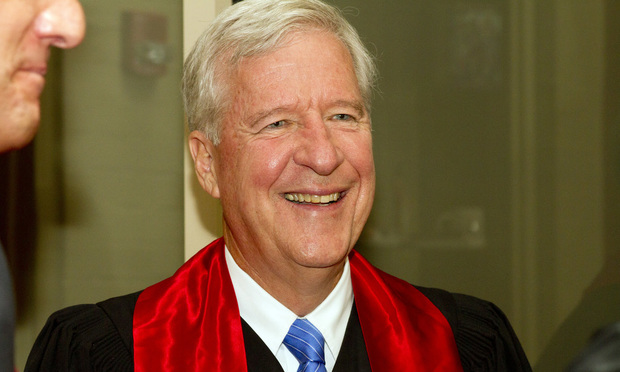Errant Filing Spills Beans on $11M American Family Insurance Settlement
The filing, which was supposed to have been sealed, was available on Pacer for nearly two weeks.
January 16, 2020 at 01:27 PM
7 minute read
 Judge Richard Story, U.S. District Court for the Northern District of Georgia. (Photo: John Disney/ ALM)
Judge Richard Story, U.S. District Court for the Northern District of Georgia. (Photo: John Disney/ ALM)
A fight over sealing a settlement in a high-profile insurance wrangle may be for naught after an American Family Insurance filing inadvertently revealed the details of the $11 million deal.
The November settlement was reached just before opening arguments in a retrial of a closely watched car crash case that initially ended in a $30 million jury verdict, which was overturned on appeal. A Dec. 31 filing in parallel litigation in the U.S. District Court for the Northern District of Georgia between the defendant driver and his insurer, American Family Insurance, revealed the details of that $11 million settlement on Pacer, the court's online filing system.
The Motion for Leave to File Under Seal revealing the settlement figure was available to the public until Wednesday.
"This was inadvertently filed by the clerk without being under seal," said Edward Ruff III of Pretzel & Stouffer in Chicago, who represents AmFam.
Ruff said the disclosure was due to a clerical error and asked that the disclosure not be reported until Judge Richard Story rules upon pending motions on whether to seal it.
Ruff represents AmFam with firm colleagues Robert Chemers and Michael Turiello and Ryan Burke, Jessica Pardi and Seslee Smith of Morris, Manning & Martin in Atlanta.
The attorney for the injured woman who settled the case last month said he was "concerned and troubled" by the breach of confidentiality.
"It is my understanding that no one should be saying anything other than 'the case has been resolved to the satisfaction of all parties,'" said Brodhead Law principal Ben Brodhead.
His client, accident victim Luisa Cruz Mezquital, is "a very private person and would like to have her privacy protected," said Brodhead. "Public filings disclosing private information improperly compromise her privacy."
Brodhead was unimpressed by AmFam's claims on how the settlement was accidentally disclosed.
"They can try to blame the court if they want, but experienced attorneys can take sufficient steps to maintain confidentiality if they want to keep something confidential," he said.
"For instance, when my firm filed confidential documents in the same case, we hand delivered the confidential material to the court so that it was never uploaded in the first place," Brodhead said.
Courts and lawyers have occasionally botched redacting or sealing court documents. Jones Day apologized after it failed to redact confidential grand jury information from a September court filing in Virginia. And an exhibit included in a filing in Roger Stone's criminal case in Washington, D.C., was subsequently yanked from Pacer and redacted after it appeared to list President Donald Trump's cellphone number.
The disclosure comes amid efforts by AmFam to hold the defendant driver, Abdulmohsen Almassud, responsible for what it paid both to defend and settle the case.
Almassud filed counterclaims against AmFam, saying its bad faith refusal to settle the case for its policy limits years ago is what caused him to be sued and hit with the since-vacated $30 million judgment in the first place.
Almassud is represented by Slappey & Sadd partners Jay Sadd and Rich Dolder. Dolder said he could not comment on the litigation, but last week they filed a motion opposing AmFam's bid to keep the settlement agreement sealed.
The case began in 2012 when Almassud's Jeep hit Mezquital's minivan. Her left hand went through the window and was severely injured as the Jeep scraped down the side of her vehicle.
Mezquital sued Almassud in Fulton County State Court, and her lawyers learned during discovery that the Jeep had been modified for off-road use.
Almassud blamed a garage that installed the new equipment, and it was added as a defendant. The jury awarded $30.4 million against Almassud and apportioned no liability to the garage after a 2016 trial.
Almassud's insurer, AmFam, funded his defense but also filed a declaratory judgment action in federal court against him and Mezquital, arguing it should not be responsible for Almassud's defense or any potential judgment.
AmFam's arguments included assertions that Almassud had not cooperated with it and had falsely told its investigator that he was not driving the Jeep off-road prior to the wreck.
The Georgia Court of Appeals threw out the verdict in 2018, ruling the jury should have been instructed that Almassud's claim that he was unaware of the hazardous condition of his vehicle could be raised as a defense to claims for negligence per se.
The Georgia Supreme Court declined to hear an appeal of that decision, teeing up a retrial.
A November retrial in Fulton County ended in a settlement, details of which were not disclosed at the time, and Northern District Judge Richard Story lifted a stay pending resolution of the underlying suit in the parallel federal litigation.
Five days after the Fulton County case settled, Almassud's lawyers filed a motion asking the court to realign the parties and have him named plaintiff and AmFam as defendant, arguing that there is no longer any lawsuit to defend and there will never be a judgment against him, rendering the insurers' claims moot.
The motion said the only remaining claims between those parties should be Almassud's counterclaims for breach of fiduciary duty, attorney fees and punitive damages.
In its Dec. 31 motion asking Story to seal the settlement and related documents, AmFam said its confidentiality concerns outweighed the public's right of access to court filings because of its confidentiality provision and because of "Georgia policy favoring settlements."
Story granted the motion on Jan. 3, "because said documents contain confidential information not of vital public concern and because the sealing of these confidential documents will not impair this Court's functions to address publicly the central issues involved in this action."
Almassud's lawyers asked Story to reconsider his ruling on Jan. 10, writing that they had not had a chance to argue AmFam's motion and that sealing the documents in question breached Eleventh Circuit standards for deciding when a document should be made public.
"The release AmFam wants filed under seal is 'in connection with' two substantive motions: AmFam's Second Motion to Amend Complaint, in which AmFam seeks reimbursement of amounts it paid to settle the Underlying Lawsuit; and [Almassud's] Motion for Summary Judgment, which AmFam opposes based, in part, on an alleged right to reimbursement," the motion for reconsideration said.
"Thus, the release AmFam wants filed under seal is subject to the common law right of access and is 'presumptively public,'" it said. "AmFam cannot fulfill its burden to overcome the presumption that the document remain unsealed."
In a ruling entered Jan. 15, Story agreed that Almassud should have been allowed to argue the motion and gave the insurer 21 days to respond to Almassud's arguments, its motion to seal and to amend its complaint.
In a separate ruling, Story also sealed the motion to seal, noting that it contained "confidential information that AmFam wishes to keep confidential."
This content has been archived. It is available through our partners, LexisNexis® and Bloomberg Law.
To view this content, please continue to their sites.
Not a Lexis Subscriber?
Subscribe Now
Not a Bloomberg Law Subscriber?
Subscribe Now
NOT FOR REPRINT
© 2025 ALM Global, LLC, All Rights Reserved. Request academic re-use from www.copyright.com. All other uses, submit a request to [email protected]. For more information visit Asset & Logo Licensing.
You Might Like
View All
Insurer Not Required to Cover $29M Wrongful Death Judgment, Appeals Court Rules

Trying to Reason With Hurricane Season: Mediating First Party Property Insurance Claims


'I Thank You': Attorney Leverages Daily Report Article to Turn $42K Offer Into $600K Settlement
7 minute readLaw Firms Mentioned
Trending Stories
- 1Uber Files RICO Suit Against Plaintiff-Side Firms Alleging Fraudulent Injury Claims
- 2The Law Firm Disrupted: Scrutinizing the Elephant More Than the Mouse
- 3Inherent Diminished Value Damages Unavailable to 3rd-Party Claimants, Court Says
- 4Pa. Defense Firm Sued by Client Over Ex-Eagles Player's $43.5M Med Mal Win
- 5Losses Mount at Morris Manning, but Departing Ex-Chair Stays Bullish About His Old Firm's Future
Who Got The Work
J. Brugh Lower of Gibbons has entered an appearance for industrial equipment supplier Devco Corporation in a pending trademark infringement lawsuit. The suit, accusing the defendant of selling knock-off Graco products, was filed Dec. 18 in New Jersey District Court by Rivkin Radler on behalf of Graco Inc. and Graco Minnesota. The case, assigned to U.S. District Judge Zahid N. Quraishi, is 3:24-cv-11294, Graco Inc. et al v. Devco Corporation.
Who Got The Work
Rebecca Maller-Stein and Kent A. Yalowitz of Arnold & Porter Kaye Scholer have entered their appearances for Hanaco Venture Capital and its executives, Lior Prosor and David Frankel, in a pending securities lawsuit. The action, filed on Dec. 24 in New York Southern District Court by Zell, Aron & Co. on behalf of Goldeneye Advisors, accuses the defendants of negligently and fraudulently managing the plaintiff's $1 million investment. The case, assigned to U.S. District Judge Vernon S. Broderick, is 1:24-cv-09918, Goldeneye Advisors, LLC v. Hanaco Venture Capital, Ltd. et al.
Who Got The Work
Attorneys from A&O Shearman has stepped in as defense counsel for Toronto-Dominion Bank and other defendants in a pending securities class action. The suit, filed Dec. 11 in New York Southern District Court by Bleichmar Fonti & Auld, accuses the defendants of concealing the bank's 'pervasive' deficiencies in regards to its compliance with the Bank Secrecy Act and the quality of its anti-money laundering controls. The case, assigned to U.S. District Judge Arun Subramanian, is 1:24-cv-09445, Gonzalez v. The Toronto-Dominion Bank et al.
Who Got The Work
Crown Castle International, a Pennsylvania company providing shared communications infrastructure, has turned to Luke D. Wolf of Gordon Rees Scully Mansukhani to fend off a pending breach-of-contract lawsuit. The court action, filed Nov. 25 in Michigan Eastern District Court by Hooper Hathaway PC on behalf of The Town Residences LLC, accuses Crown Castle of failing to transfer approximately $30,000 in utility payments from T-Mobile in breach of a roof-top lease and assignment agreement. The case, assigned to U.S. District Judge Susan K. Declercq, is 2:24-cv-13131, The Town Residences LLC v. T-Mobile US, Inc. et al.
Who Got The Work
Wilfred P. Coronato and Daniel M. Schwartz of McCarter & English have stepped in as defense counsel to Electrolux Home Products Inc. in a pending product liability lawsuit. The court action, filed Nov. 26 in New York Eastern District Court by Poulos Lopiccolo PC and Nagel Rice LLP on behalf of David Stern, alleges that the defendant's refrigerators’ drawers and shelving repeatedly break and fall apart within months after purchase. The case, assigned to U.S. District Judge Joan M. Azrack, is 2:24-cv-08204, Stern v. Electrolux Home Products, Inc.
Featured Firms
Law Offices of Gary Martin Hays & Associates, P.C.
(470) 294-1674
Law Offices of Mark E. Salomone
(857) 444-6468
Smith & Hassler
(713) 739-1250






